Videos
Spring 2026
Predicting the Unpredictable
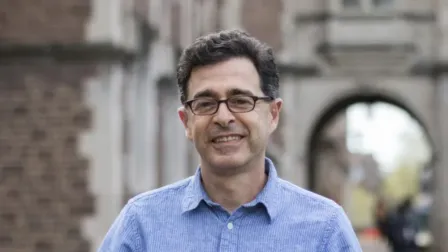
| Surprises in the Math of Bouncing and Rolling: Finding Stability Where Randomness and Chaos are ExpectedRenato Feres |
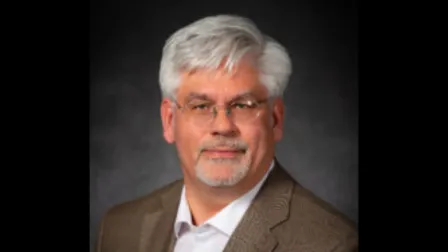
| Probability in Quantum Mechanics: From Stern-Gerlach, to Antenna Polarizations, to Quantum QubitsJoe ZehnleFebruary 14, 2026 |
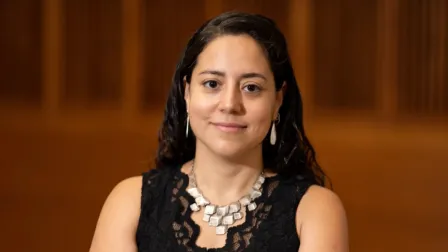
| Worm Regeneration and Reproduction: A Story in Several SegmentsDuygu ÖzpolatFebruary 7, 2026 |
Fall 2025
Interdisciplinarity & the Unity of Science
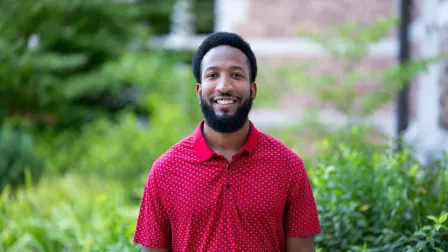
| The Physics of Mysterious Cellular DropletsTrevor GrandPreNovember 8, 2025 |

| Physics and the Puzzle of Artificial IntelligenceZohar NussinovNovember 1, 2025 |
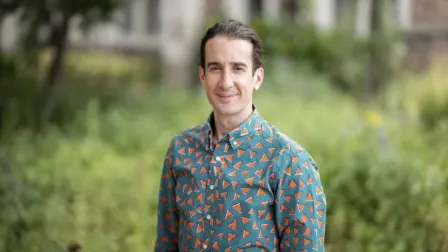
| Why You Might Want Your Brain at the Very Edge of ChaosKeith HengenOctober 25, 2025 |

| The Physics of Everything: Ambition, Failures, SuccessesMikhail TikhonovOctober 18, 2025 |
Spring 2025
Complex behaviors from simple rules
Our daily lives are largely governed by a simple set of physical laws: the laws of gravity, put forth by Newton in 1687, and Maxwell’s equations for electricity and magnetism, found by Maxwell in 1861. From these fundamental forces, a vast variety of patterns and strucutures arise: galaxies, rainbows, beehives and more. Much of this is emergent behavior: It’s hard to predict, but once you know it happens, you can look for what makes it happen. In this series of lectures, we will examine the interplay between the emergence of complexity and the reduction to simple laws of nature.
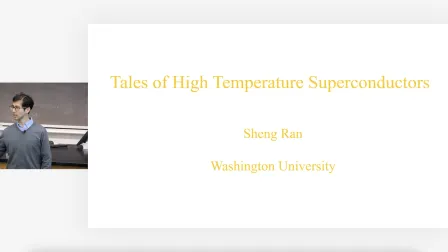
| Tales of High Temperature SuperconductorsSheng RanApril 6, 2025 |
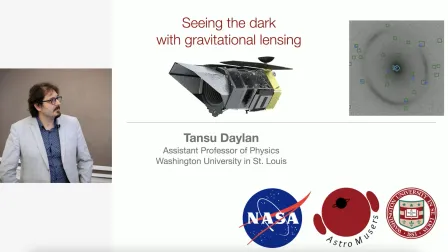
| Seeing the dark with gravitational lensingTansu Daylan and Bryce WedigMarch 29, 2025 |
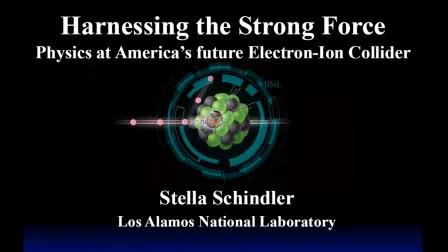
| Harnessing the Strong ForceStella SchindlerFebruary 29, 2025 |
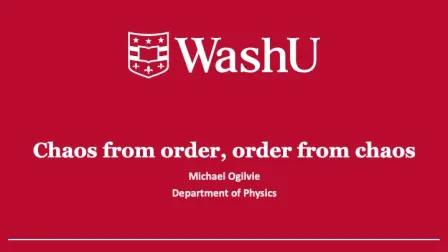
| Chaos from order, order from chaosMichael Ogilvie, Department of Physics,Washington University in St. LouisFebruary 22, 2025 |
Fall 2024
Research in Progress
Science is not static. Our knowledge of the universe is always growing and changing. Every field evolves as new tools, new concepts and new data become available. In this series of lectures, we explore that process of evolution from the perspective of WashU faculty members.
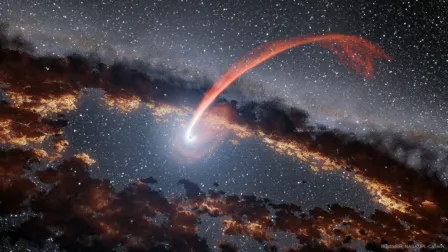
| When Forces Collide: Pattern and Structure in our Universe(no video recording available) Michael Ogilvie, Department of Physics,Washington University in St. LouisNovember 9, 2024 |
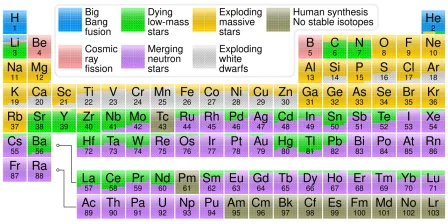
| The making of chemical elements from the Big Bang to the laboratory(no video recording available) Lee Sobotka, Department of Chemistry and Physics,Washington University in St. LouisNovember 16, 2024 |
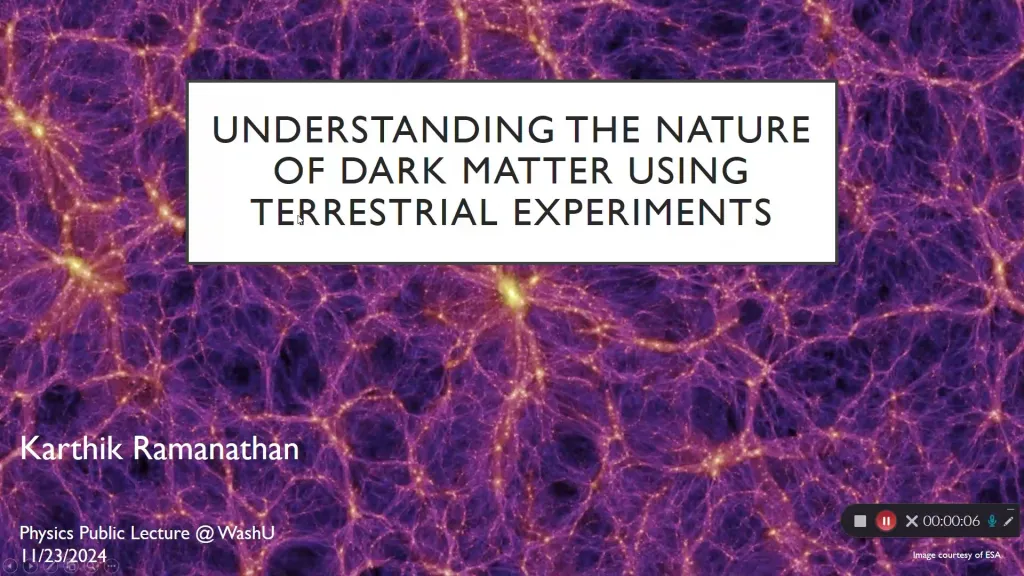
| Understanding the nature of dark matter using terrestrial experimentsKarthik Ramanathan, Department of Physics,Washington University in St. LouisNovember 23, 2024 |
Spring 2024
Eclipses: Day into Night
On Monday, April 8th, 2024, a total solar eclipse will cross the United States. St. Louis will be close to the path of totality, which will pass over the Poplar Bluff area around 2 PM CDT. There will not be another total solar eclipse in the lower 48 states until August 23rd, 2044. To mark this dramatic celestial event, the Department of Physics will sponsor a series of public lectures by faculty members on the science and history of eclipses, to be held on Saturday mornings this February and March.
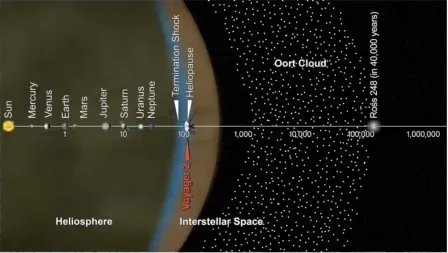
| Written in the alignment of planets and starsTansu Daylan, Department of Physics,Washington University in St. LouisMarch 2, 2024 |
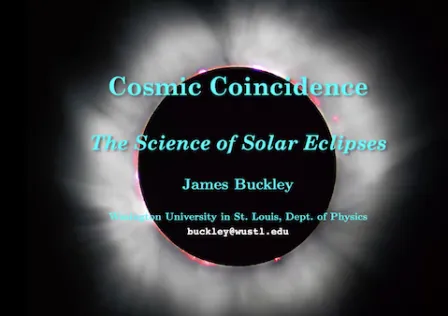
| Cosmic Coincidence: The Science of EclipsesJim Buckley, Department of Physics,Washington University in St. LouisFebruary 10, 2024 |
Fall 2023
The Legacy of J. Robert Oppenheimer
At the end of World War II, J. Robert Oppenheimer was America’s most famous scientist and American science enjoyed enormous prestige and support. The movie Oppenheimer has made accessible his brilliant and complex personality, his essential contribution to the Manhattan project, and his fall from grace post-war at the hands of political enemies. However, even at three hours, the movie could not show his breadth as a scientist and scientific leader. In this lecture series. we will examine Oppenheimer‘s legacy and his position in science and in history.

Neutron stars: last exit before the black hole (no video recording available)
Mark Alford, Department of Physics, Washington University in St. Louis
November 18, 2023
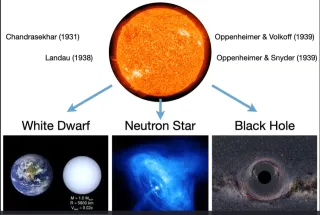
Black Holes, Bombs, & Beyond
Michael Nowak, Department of Physics, Washington University in St. Louis
November 11, 2023
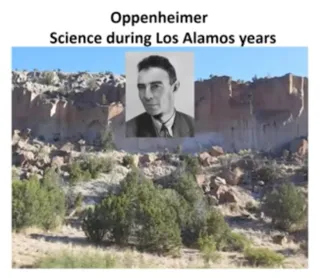
Oppie – the Los Alamos Years: nuclear science and a weapons primer
Lee Sobotka, Department of Physics, Washington University in St. Louis
November 4, 2023
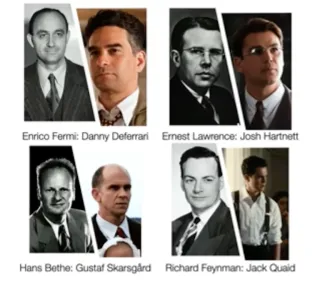
Oppenheimer’s pre-war research and the rise of American quantum physics
Michael Ogilvie, Department of Physics, Washington University in St. Louis
October 28, 2023
Spring 2023
Physics in Our Future
Progress in physics often drives technological change, but new technologies also enable new discoveries in physics. This cycle of discovery and innovation in turn leads to changes in the way we live. All aspects of our lives are affected, from how we understand the universe to how we get electricity and pay our bills. In this semester’s lectures, we look at several aspects of this process, and the impact the physics of today and tomorrow will have on our lives in the next few decades.

X-ray Astronomy in Living Color
Mike Nowak, Department of Physics, Washington University in St. Louis
April 22, 2023

Physics and Our Next 20 Years
Mike Ogilvie, Department of Physics, Washington University in St. Louis
April 15, 2023
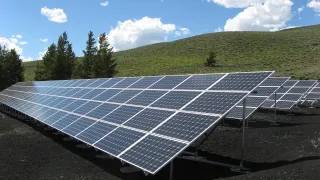
What Would a Renewable Energy System for St. Louis Look Like?
Anders Carlsson, Department of Physics, Washington University in St. Louis
April 1, 2023
Fall 2022
Compton Centennial Celebration
Arthur Holly Compton (September 10, 1892 – March 15, 1962) was an American physicist who conducted groundbreaking research in Eads Hall here at Washington University in the 1920s. In 1922, as head of the Department of Physics, Compton conducted X-ray scattering experiments that demonstrated the particle nature of electromagnetic radiation. At the time, the idea that light had both wave and particle properties was not easily accepted. Through his research, he explained that each ray behaved as a particle, conserving both energy and momentum in collisions with electrons. This provided the first proof that X-rays—formerly thought to be waves—could also behave as particles, confirming a long-standing, but largely ignored prediction by Albert Einstein. Compton’s discovery stimulated the development of quantum mechanics, and was recognized with the Nobel Prize in 1927.
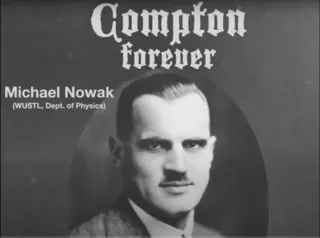
Compton Forever
Mike Nowak, Department of Physics, Washington University in St. Louis
November 5, 2022
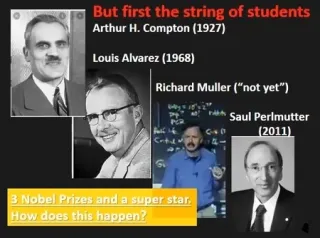
Arthur Holly Compton’s Influence on WashU Chemistry
Lee Sobotka, Departments of Chemistry and Physics, Washington University in St. Louis
October 29, 2022
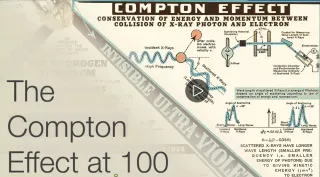
The Compton Effect at 100
Erik Henriksen, Department of Physics, Washington University in St. Louis
October 15, 2022
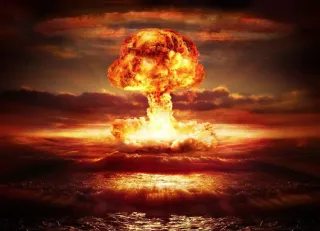
Compton and WWII: the Manhattan Project
Mike Ogilvie, Department of Physics, Washington University in St. Louis
October 22, 2022
Spring 2022
A Physics Potpourri
Q: What do physicists do on their days off?
A: We don’t really take days off. However, we do occasionally branch off into things which may seem not quite central to our research, as a sort of busman’s holiday. In this series of Saturday Science lectures by Mike Ogilvie, Carl Bender and Zohar Nussinov, we explore and explain some of those interests.
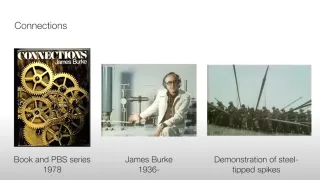
Connections: A Modern Physics Sequel
Mike Ogilvie, Department of Physics, Washington University in St. Louis
March 26, 2022
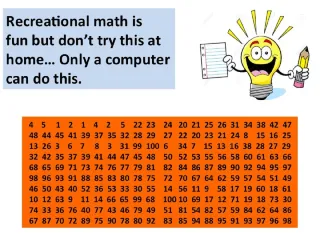
Is the Number 312132 Interesting?
Carl Bender, Department of Physics, Washington University in St. Louis
April 2, 2022
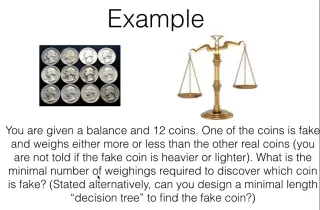
Information, Physics, and Machine Learning
Zohar Nussinov, Department of Physics, Washington University in St. Louis
April 9, 2022
Fall 2021
The McDonnell Center for the Space Sciences at Washington University in St. Louis brings together experts in multiple disciplines to address great questions in space science as we explore and seek to comprehend our surroundings and our beginnings. This series highlights research in the Department of Physics and the Department of Earth and Planetary Sciences that builds on past discoveries and exploration, asks new questions, and seeks innovative ways to further test and explore phenomena in our Solar System and in the Universe. Please join us for this exciting series of lectures and exploration!
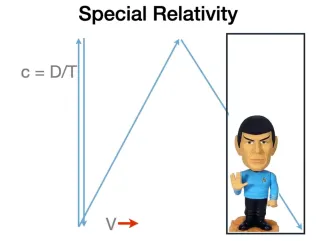
A Brief History of Time (Delays): 50 Years of Tests of General Relativity
Michael Nowak, Department of Physics, Washington University in St. Louis
October 16, 2021
Note that the Zoom recording failed, so this is a PowerPoint presentation and not the complete lecture.
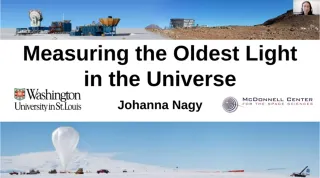
Measuring the Oldest Light in the Universe
Johanna Nagy, Department of Physics, Washington University in St. Louis
October 23, 2021
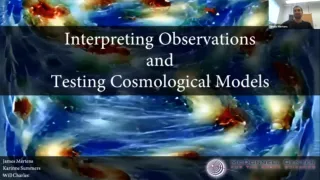
Interpreting Observations and Testing Cosmological Models
James Mertens, Department of Physics, Washington University in St. Louis
October 30, 2021
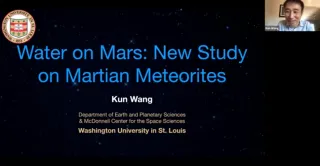
Water on Mars: New Constraints from Martian Meteorites
Kun Wang, Department of Earth and Planetary Sciences, Washington University in St. Louis
November 6, 2021
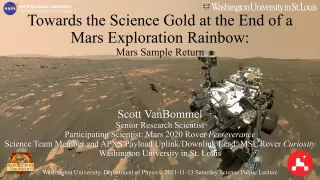
Towards the Science Gold at the End of a Mars Exploration Rainbow: Mars Sample Return
Scott VanBommel, Department of Earth and Planetary Sciences, Washington University in St. Louis
November 13, 2021
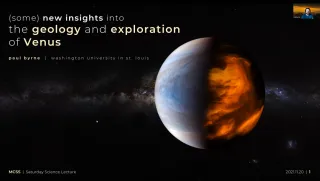
New Insights into the Geology of Venus
Paul Byrne, Department of Earth and Planetary Sciences, Washington University in St. Louis
November 20, 2021
Spring 2021
Physics is a human enterprise: its boundaries are set by what physicists do, causing physics departments to grow and transform. New faculty members bring energy and new ideas to departments, forge new connections to other disciplines, and train students in new methods and techniques. In this lecture series, we introduce some of our department’s newer faculty members and let them explain their research interests.
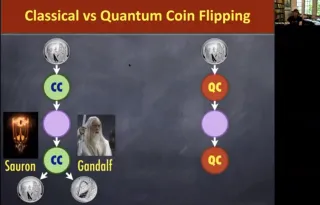
Quantum Computing for Beginners
Gerardo Ortiz, Indiana University - Bloomington
May 2, 2021
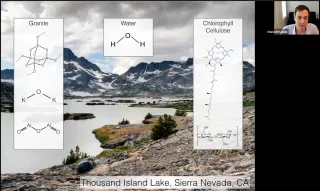
Using Antimatter to Find Dark Matter
Manel Errando, Washington University in St. Louis
April 24, 2021
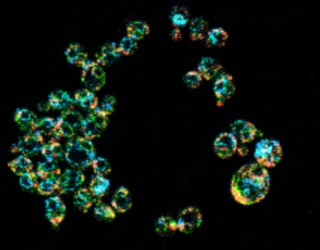
The Next Revolution in Physics: Microbial Ecology?
Mikhail Tikhonov, Washington University in St. Louis
April 17, 2021
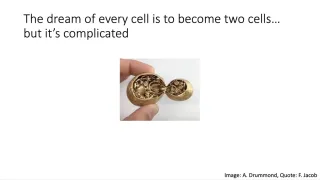
Cellular Self Assembly
Shankar Mukherji, Washington University in St. Louis
April 10, 2021
Fall 2020
The Center for Quantum Sensors at Washington University in St. Louis brings together scientists working on the development and engineering of quantum technologies and materials and scientists using quantum technologies for cutting-edge research in physics and related disciplines. Members of the Center are currently involved in projects related to quantum information, quantum optics, quantum materials, quantum measurements, quantum sensors for astrophysics, and quantum sensors for fundamental physics. The center leverages the members’ experience with the fabrication of quantum sensors and the deployment of the sensors in extreme environments, e.g. on balloons, satellites, in remote geographical areas, and in underground laboratories.
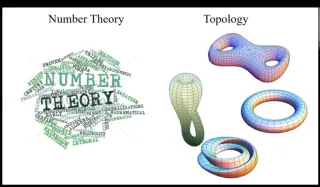
Topology Meets Quantum Mechanics
Sheng Ran, Washington University in St. Louis
October 3, 2020
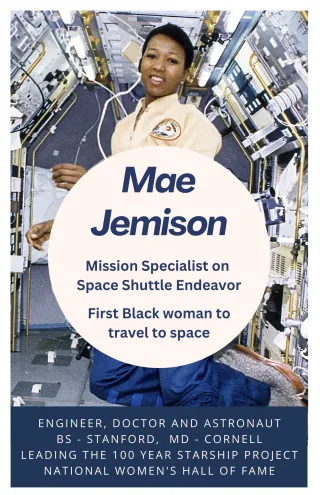
Welcoming the Second Quantum Revolution
Kater Murch, Washington University in St. Louis
October 10, 2020
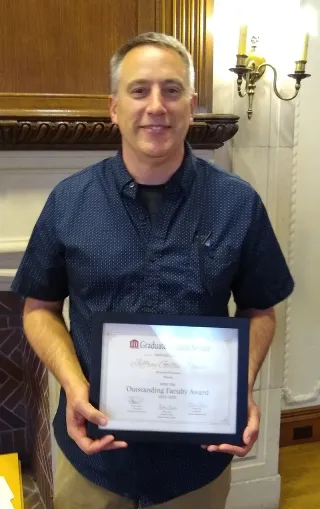
From Quantum Mysteries to Quantum Technologies
Igor Pikovski, Stevens Institute of Technology & Stockholm University
October 17, 2020
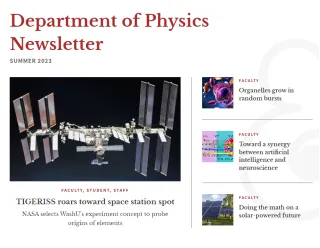
Quantum Math - the Superposition Principle, Bell's Inequality, and Uncertainties
Zohar Nussinov, Washington University in St. Louis
October 24, 2020
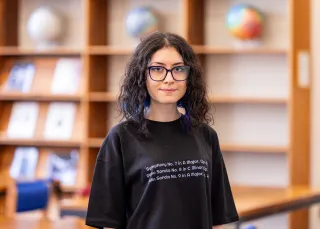
Maxwell’s Demon and the Second Law of Thermodynamics
Assa Auerbach, Sidney and Elizabeth Corob Chair in Sciences, Department of Physics, Technion, Israel
November 7, 2020
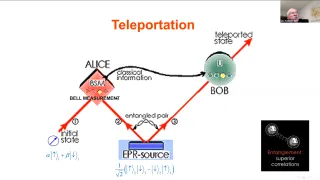
From Quantum Miracles to Parallel Worlds
Lev Vaidman, The Alex Maguy-Glass Chair in Physics of Complex Systems, Physics Department, Tel Aviv University
November 14, 2020
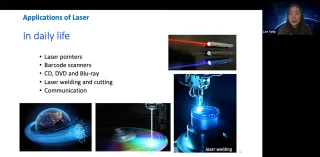
Explore the Magic of Light
Lan Yang, Edwin H. & Florence G. Skinner Professor, Electrical and Systems Engineering, Washington University
November 21, 2020